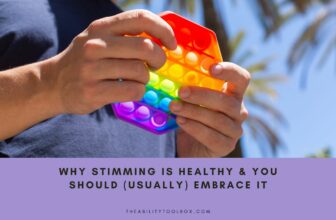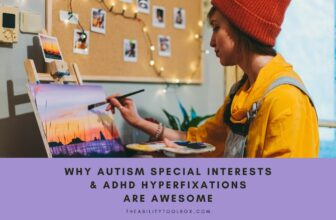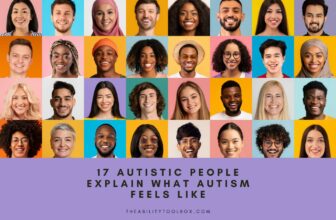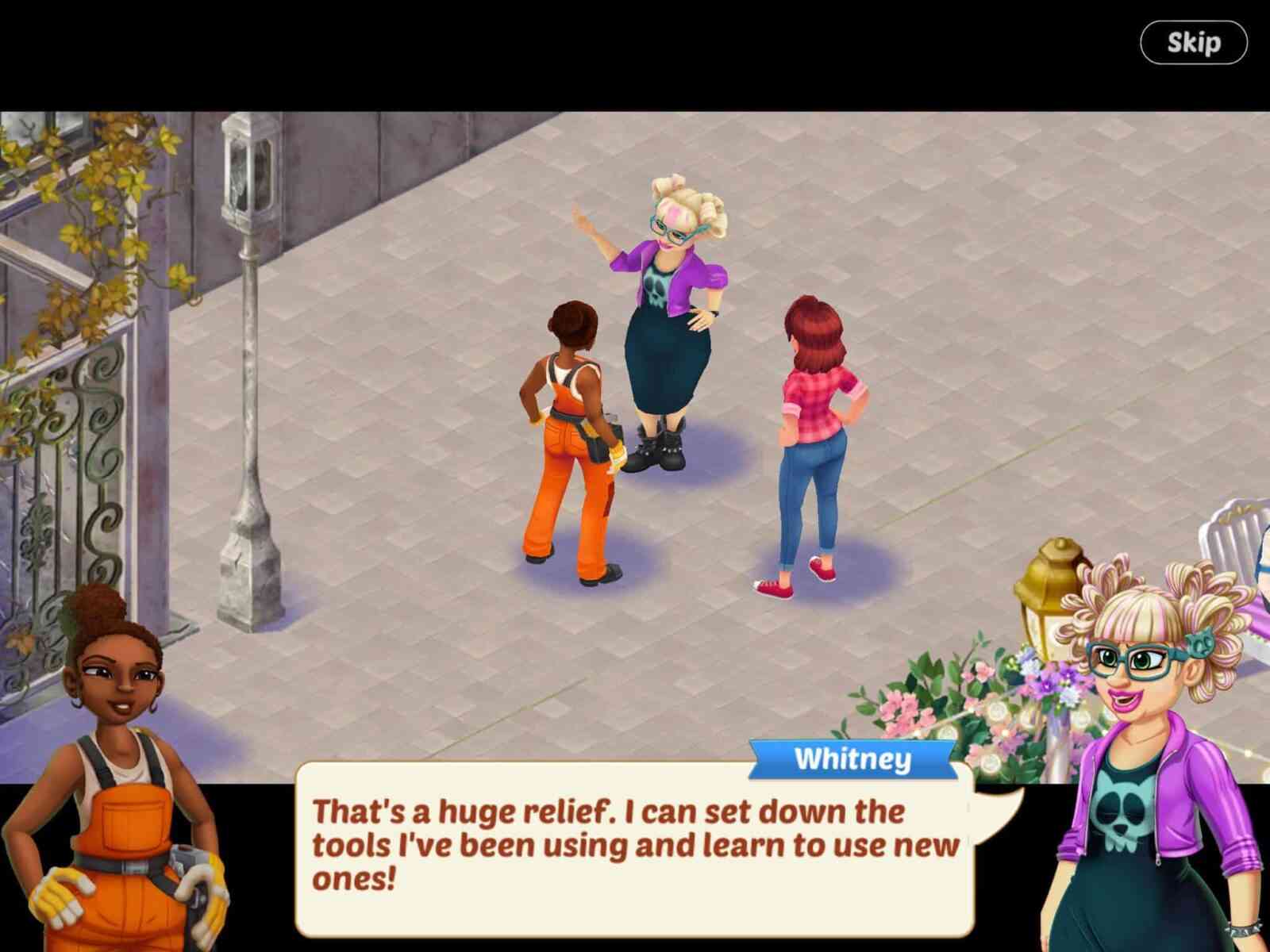
Popular culture often misses the mark when it comes to autistic characters and storylines—when autistic representation is even present to begin with. Whether it’s Sheldon Cooper from The Big Bang Theory, Dr. Shaun Murphy from The Good Doctor, or Raymond Babbitt in the film Rain Man, characters who are canonically autistic or theorized as such tend to reflect (and then reinforce) certain stereotypes. Not only do they perpetuate the deficit model of autism, such characters are also overwhelmingly male, white, straight, and cisgender. It may be autistic representation, but it’s not necessarily good representation.
Sometimes, though, a production surprises us in a good way.
September 2022 brought us the reboot of Heartbreak High, and with it, the amazing Quinni. Just two months later, we got some refreshingly positive autistic representation in an unexpected place: Lily's Garden, a casual mobile game that hit the peak of its popularity in 2020 and is still a leader in the “family” category.
Since its 2019 release, the game has been downloaded more than 70 million times and earned more than $350 million. With 1.7 million followers on Facebook, just shy of 900,000 followers on Instagram, and 151,000 followers on TikTok, Lily’s Garden is a hugely successful game with a dedicated fanbase. Importantly, like other games in the casual genre, the majority of players are women, a demographic frequently overlooked by autism researchers and diagnosticians.
Marketed primarily in the romance genre, the matching and design game relies heavily on its engaging narrative aspect. In Brian Feldman’s fantastic 2019 article, “The Story Behind Those Bizarre, Incredible Lily’s Garden Ads,” then-writer Stella Sacco talks about the groundbreaking way that Lily’s Garden engages with its predominant demographic. She notes, “So many pieces of [women’s] media are catty, and really do involve women tearing each other down. It is everywhere. And the amount of people who have reacted positively to [the substantive female friendships] in the game, it makes me happy.”
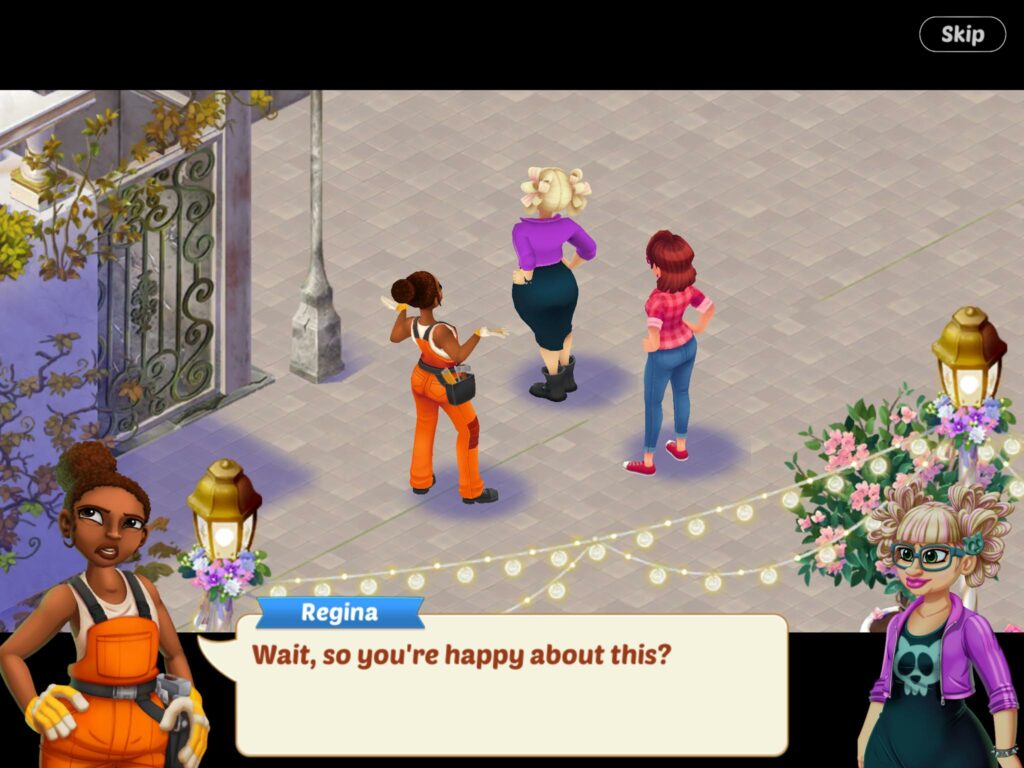
Note: The following contains spoilers for Lily’s Garden from Chapter 5 onward.
Since its launch, the game has quietly become an example of inclusive rep done well; what initially looked to be a cisheteronormative story has since evolved into one filled with diverse characters. There are interracial couples, LGBTQ couples, and more. Carpenter Regina, Lily’s best friend and a staple of the game since day one, realizes along the way that she needs to start building with accessibility features in mind, and this becomes a recurring theme in her dialogue. A few chapters in, we meet geeky femme Whitney, a character later revealed to be queer — and, as of November 2022, autistic.
As a queer femme who discovered my autistic identity late in life, I was unsurprised by the revelation. Whitney had quickly become my favorite character; I recognize a lot of myself in her. When I saw her tell Regina and Lily about her new autism diagnosis, and why that diagnosis makes her happy, I squealed with excitement and validation.
It’s affirming representation that feels incredibly authentic — and its importance cannot be overstated. By refusing to perpetuate a pathologizing narrative, Lily’s Garden is accomplishing something powerful. Particularly in light of the game’s demographics, the positive manner in which Whitney and the other characters approach her autism diagnosis has tremendous potential for impact. Like Whitney, a lot of femme folks don’t realize they’re until later in life. Players who identify with Whitney and see themselves in her may, upon learning of her diagnosis, start down their path to self-discovery; others may come to a better and more supportive understanding of the autistic people in their life, particularly their children.
Wanting to know more about this came to be, I recently had the pleasure of interviewing Christine Ellis, Lead Narrative Designer for Lily’s Garden. She joined Tactile in 2021; she notes that the game has had lots of writers, and there are at least 114 story days that she had no hand in. That said, she tells me that Whitney is one of her favorite characters—and she wrote the scene in which Whitney tells the others about her autism spectrum diagnosis!
Christine and I chatted about Whitney, her role in the game world, fan reception to her autism diagnosis, the importance of inclusive representation, and more.
Lynne: From the outset, Whitney was presented as a wonderfully geeky character with a unique approach to life. Though it wasn’t until a few story arcs later that we learned that she’s canonically autistic, the clues were there. Was Whitney always intended to be autistic, or did this develop along the way as the writing team developed her as a character through each storyline?
Christine: I wasn't at Tactile when Lily's Garden or any of the original Chapter 1 and 2 characters were conceived. I'm not sure what the initial intention was with Whitney, but I also loved her from the outset! And I completely agree that the clues were there.
When I started working on the game in 2021, it was the beginning of Chapter 5, where a lot of the focus was on the romance between Whitney and Regina. The biggest conflict between those two is really that they have entirely different communication styles and tactics for handling emotional discomfort. I probably started thinking about Whitney as neurodivergent during that storyline, but not consciously. Just in the way that I was looking for her emotional truths, her wants, and her motivations in the context of her relationship with Regina, and within the wider world of the story. If she thought about things differently and expressed things differently, that made the conflict between her and Regina less about anything external, and more about two people trying to find the right love language. That felt very accessible to me.
Something our amazing game director, Jedidjah Noomen, said rings true for a lot of the ways these characters have grown over the years: One of the fun and exciting things you can do as a writer taking over an existing character is to find the hidden things about them, the things that have never been said out loud, and decide to say them.
Lynne: Lily’s Garden addresses themes that set it apart from other games in its genre, and does so with a richly diverse cast of characters — in addition to Lily and Luke’s story, we see love bloom between older couples, LGBTQ couples, and interracial couples, for example, and their storylines include topics such as racism, ableism, having children outside of marriage, and choosing to remain childfree. Can you tell me a little bit about what motivates the team to create these inclusive narratives? What makes Whitney an important contribution to the game world?
Christine: I think I speak for the whole story team when I say that we want the game to reflect the world we live in, and to invite everyone to feel seen in it. All the things you mentioned exist in the world I experience every day, and while we always want players to be able to use Lily's Garden as an escape, we believe all of those stories and experiences have value. Whitney, in particular, has a unique take on the world, and no matter what's happening in the events of the story, she sees it all a little differently from the other characters. Sometimes that shakes free solutions for her friends and sometimes it forces them to sit with their own misconceptions or feelings. She's also obviously a HUGE nerd, and we are game developers, so there are times when Whitney is absolutely also the writers' voice.
Lily's Garden is also at its heart a story about hope and joy and community. We try to tackle serious issues in a way that doesn't stress players out or destroy the safety of the world of the game. I think that attitude has contributed hugely to the positive representation you find in the story.
Lynne: How has Whitney been received by players? Did you notice a change in feedback or fan perception following the in-game reveal of her autism diagnosis?
Christine: According to our amazing User Research team, Whitney is our players' favorite side character! They find her deeply relatable and fun, and she is the character most players want to see more of. We got some lovely notes after the in-game reveal of her diagnosis! Players reached out to thank us for the representation, tell us about their loved ones on the spectrum, or that they had received similar diagnoses as adults. It was really so affirming and it felt like we had made the best, easiest choice to help a lot of people feel seen and welcome in the game.
Lynne: Autism in femmes often goes unrecognized because it doesn’t “look” like autism; it doesn’t conform to what stereotypes would have us believe. The writing for Whitney gets a lot of things right. How do you ensure that she’s written both accurately and positively without falling into the “autistics have superpowers” trope that pervades pop culture?
Christine: I knew when we decided to do it that I wanted to make sure it felt real, and that we took it seriously, but we didn't want it to be like dropping some huge truth bomb or for it to explode Whitney's life or anything. We wanted it to be a true thing about her without changing the character players know and love at all. That meant finding the right context to do it in, and when the FBI storyline came up, that seemed like the perfect way to handle it. She's not looking for answers but she gets them anyway, and like Regina says in the game, Whitney loves answers! Whitney is, in her heart, a sleuth; she goes into spirals trying to find truths. I thought it would feel really satisfying to have solved the mystery of herself.
I have family and friends who are on the autism spectrum, so I went into it with more specific experiences that I could draw from, and at least a closer outside perspective. Lily and Regina's reactions certainly reflect my own. A lot of my loved ones who have received adult diagnoses for autism, ADHD, etc, have said it was a relief to know there were answers, there were reasons, for the ways they were feeling and thinking. (Some of them had horrible experiences, too, but I think we see those in media a lot more frequently, and they are more prone to tipping into the tropes you mention above). That feeling of relief seemed empowering, so I made it the strongest emotional beat for Whit.
(I also LOVE Hannah Gadbsy's second Netflix special Douglas, which is hilarious and absolutely brilliant. She structures it in such a way as to take the audience on a trip through her own mind after her autism diagnosis. She talks about how the diagnosis helped her understand the world better, and love her brain more, and that really touched me. I lifted it unashamedly.)
Lynne: A number of autistic femmes identify as LGBTQ. With that in mind, let’s talk about Whitney’s relationship with Regina, whose journey includes developing a commitment to accessible design. The two characters present not only stigma-free discussions of disability, they also serve as positive LGBTQ representation. Was this aspect of Whitney designed to be intentionally reflective of her identity as an autistic femme?
Christine: I wish I could say yes! In my mind, yes. By the time I joined the Lily's Garden team, Whitney and Regina were a couple but their relationship had not really been acknowledged in the game. We purposefully avoided giving them conflict that had anything to do with “coming out,” because there are so many of those stories out there already, and we wanted to explore their relationship in different ways. The idea that they love each other but struggle to communicate felt like more fertile ground, and that absolutely came from Whitney's hyperfocused characterization and Regina's resistance to being vulnerable. The fact that they are both women didn't feel like something either of them would struggle with too much, and Whitney's “geeky, unique” personality was so firmly established already that diving deeper into it was the most exciting option. If it all feels intentionally reflective of her identity as both autistic and femme, that's because every writer on LG has touched these characters in some way and shaped them toward the identities you know, and we all build on each other's work.
And, once they've established their love language, Regina and Whitney are pretty unstoppable. As the game has gone on, we have looked for ways to give the characters growth, and having Regina, the builder, realize that she could directly influence the accessibility of anything she's building, seemed very natural. Likewise, having Whitney, the researcher who occasionally gets stuck in an internet deep dive, be recruited by the FBI, made total sense. Regina is a physical problem-solver and Whitney is a mental problem-solver. I can't say where the future will take them, but I'm pretty sure they'll keep solving problems together for a long time to come.



